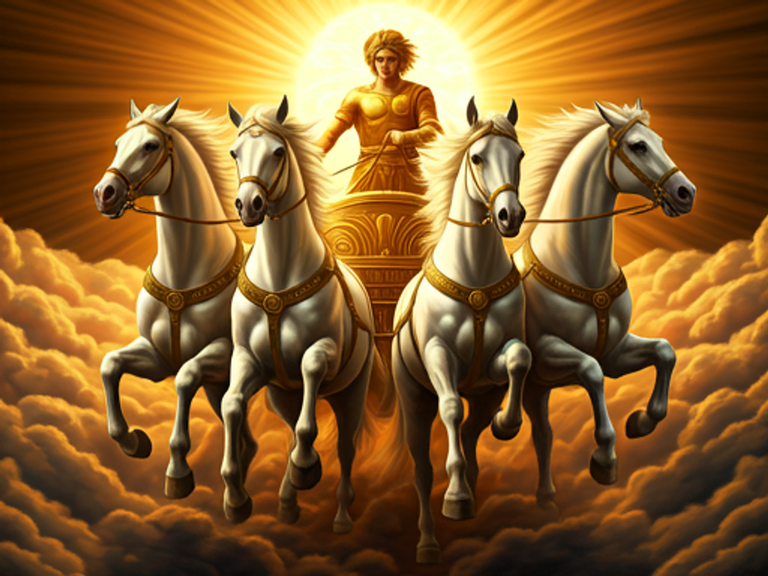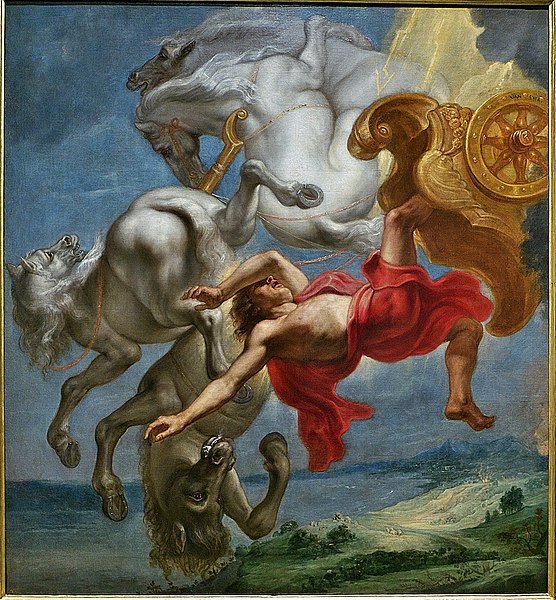Hace ya más de tres años escribí esta reseña de un libro que leí y que me impactó por su relato: Reseña de "El Informe Phaeton" — Una novela disruptiva acerca de nuestra historia remota. Es por ello que he decidido elegir este mito por su implicancia con nuestro futuro como humanidad, y obviamente también con nuestro pasado, al ser esta novela un relato de ucronía (pasado alternativo).
Este es el enlace de la iniciativa: INICIATIVA: Reinterpretación de mitos. En la comunidad Humanitas.

El mito de Phaeton es básicamente la historia de un hijo que está deseoso de conocer más y más, el deseo de control total sobre el futuro y el destino, tomar por completo las riendas del sol, de la naturaleza o del universo por decirlo de alguna manera. Este hijo es Phaeton, y su padre es Apolo/Helio. Su padre es el dios del sol, por decirlo de alguna manera, y Phaeton lo que más quiere en el mundo es poder tomar las riendas y controlar el carruaje solar de su padre, guiado por caballos salvajes mitológicos. El final de este mito es un poco obvio: su padre le concede el permiso para manejar el carruaje, pero Phaeton falla en la tarea y causa una catástrofe en el mundo y en la humanidad.
Escribiendo esto lo primero que se me viene a la mente como analogía es el relato de Adán y Eva en la Biblia, quienes también hicieron algo parecido a Phaeton. Si bien la Biblia de por sí tiene relatos míticos que podrían reinterpretarse de maneras muy interesantes, el mito de Phaeton tiene cierta relación debido a que en la novela "El Informe Phaeton" escrita por Albert Salvadó, se hace mucho enfasis en la reinterpretación de historias bíblicas, muy especialmente en el Gran Diluvio y Noé. Cuando leí esta novela me impresionó tanto su relato minucioso y reinterpretación de la historia (con fuentes bibliográficas) que casi llegué a pensar que pudiera ser real.
Este mito puede ser fácilmente extrapolado a nuestro presente y futuro como humanidad. En este momento, estaríamos en una fase de transición hacia ese futuro tecnológicamente avanzado, en el cual pudiésemos dominar y resolver prácticamente todos los problemas del mundo. Esto puede sonar positivo, y de hecho lo es, pero el problema viene con el deseo de conocimiento total, dominio total del mundo y del universo. En nuestro afán por querer conocerlo todo, producto de nuestra permanente insatisfacción como seres humanos, podría llegar un momento en el que algo salga mal, inclusive teniendo la tecnología más avanzada que jamás se haya visto.

En la novela El Informe Phaeton, la humanidad llegó a un punto tan avanzado de desarrollo tecnológico, que se planteó obtener energía ilimitada del sol, construyendo una especie de anillo alrededor del planeta para captar la luz solar. Pero todo salió mal, generando un cataclismo planetario, resquebrajando placas tectónicas y generando un diluvio global. Para variar un poco esto, podríamos plantear o imaginar otra historia alternativa:
En un futuro, digamos que en el año 3000, la humanidad habría llegado a un punto de desarrollo tan avanzado que nos planteamos extraer energía permanentemente del núcleo de la Tierra. Se plantea construir en varios puntos del planeta conductos hacia el núcleo para extraer su energía. Se tiene la tecnología suficiente para resolver el problema de construir en las altas temperaturas en el interior del planeta. Durante la construcción sucede algo que ninguna tecnología podría haber preveído. El núcleo de la Tierra se sacude generando terremotos nunca antes vistos y las placas tectónicas se abren drenando todas las aguas de los océanos (por cierto, hace un tiempo escribí un relato muy parecido a esto: El Punto Azul).
Para finalizar esta historia, podríamos agregar que varios de os científicos más importantes del planeta, liderados por "Noé", construyen una nave para escapar hacia el planeta habitable más cercano, ubicado en otro sistema solar lejano. Almacenan en laboratorios de dicha nave la información genética de todas las especies de animales y plantas de la Tierra. Una vez en dicho planeta, "Noé" enseña a la nueva humanidad naciente a temer a las fuerzas de la naturaleza, y a respetar las leyes del universo...
Algo importante en esta historia es que el padre de Phaeton, el dios Sol o Helio/Apolo, vendría siendo una representación de lo que podríamos llamar Dios o algo así como el conocimiento de todas las leyes naturales del universo, la sabiduría. No se puede controlar el mundo, sino que este está bajo el control de algo mayor a nosotros.

More than three years ago I wrote this review of a book that I read and that impacted me because of its story: Review of “The Phaeton Report” - A disruptive novel about our remote history. That is why I have decided to choose this myth because of its implication with our future as humanity, and obviously also with our past, as this novel is a story of uchronia (alternative past).
The myth of Phaeton is the story of a son who is eager to know more and more, the desire for total control over the future and destiny, to completely take over the reins of the sun, nature or the universe so to speak. This son is Phaeton, and his father is Apollo/Helios. His father is the sun god, so to speak, and what Phaeton wants most in the world is to be able to take the reins and control his father's solar chariot, guided by mythological wild horses. The ending of this myth is a bit obvious: his father grants him permission to drive the chariot, but Phaeton fails in the task and causes a catastrophe in the world and humanity.
Writing this the first thing that comes to mind as an analogy is the story of Adam and Eve in the Bible, who also did something similar to Phaeton. Although the Bible itself has mythical stories that could be reinterpreted in very interesting ways, the myth of Phaeton has a certain relationship because in the novel “The Phaeton Report” written by Albert Salvadó, there is a lot of emphasis on the reinterpretation of biblical stories, especially in the Great Flood and Noah. When I read this novel I was so impressed by his meticulous account and reinterpretation of the story (with bibliographic sources) that I almost came to think that it could be real.
This myth can easily be extrapolated to our present and future as humanity. At this moment, we would be in a transition phase towards that technologically advanced future, in which we could dominate and solve practically all the world's problems. This may sound positive, and indeed it is, but the problem comes with the desire for total knowledge and total mastery of the world and the universe. In our eagerness to want to know everything, a product of our permanent dissatisfaction as human beings, there could come a time when something goes wrong, even if we have the most advanced technology ever seen.
In the novel The Phaeton Report, humanity reached such an advanced point of technological development that it planned to obtain unlimited energy from the sun, building a kind of ring around the planet to capture sunlight. But everything went wrong, generating a planetary cataclysm, cracking tectonic plates and generating a global flood. To vary this a bit, we could pose or imagine another alternative history:
In the future, let's say in the year 3000, humanity would have reached such an advanced point of development that we consider extracting energy permanently from the Earth's core. We plan to build conduits to the core at various points on the planet to extract its energy. We have enough technology to solve the problem of building in the high temperatures in the interior of the planet. During construction, something happens that no technology could have foreseen. The Earth's core shakes generating earthquakes never seen before and the tectonic plates open up draining all the waters of the oceans (by the way, some time ago I wrote a story very similar to this: The Blue Dot).
To finish this story, we could add that several of the most important scientists of the planet, led by “Noah”, build a ship to escape to the nearest habitable planet, located in another distant solar system. They store in the ship's laboratories the genetic information of all the species of animals and plants on Earth. Once on this planet, “Noah” teaches the new emerging humanity to fear the forces of nature, and to respect the laws of the universe...
Something important in this story is that Phaeton's father, the Sun god or Helius/Apollo, would be a representation of what we could call God or something like the knowledge of all the natural laws of the universe, wisdom. The world cannot be controlled, but is under the control of something greater than us.
Translated to English language with the help of DeepL.com
Otras redes sociales:
 |
 |
 |
F1 & motorsports: @acontmotor
Expresión Creativa. Literatura | Entretenimiento | Arte: @acontblog
| ¡Gracias por visitar! — ¡Thanks for visiting!  |
Posted Using InLeo Alpha
Interesante post como siempre, no conocía el Mito, pero es así no se puede controlar el mundo.
Congratulations @acont! You have completed the following achievement on the Hive blockchain And have been rewarded with New badge(s)
Your next target is to reach 5000 replies.
You can view your badges on your board and compare yourself to others in the Ranking
If you no longer want to receive notifications, reply to this comment with the word
STOPCuando mencionas el deseo del hombre por querer controlarlo todo, el avance de la tecnología y las IA, no puedo evitar pensar en la saga de Terminator, es una película de una época en la que todo eso parecía muy lejano y pues, aquí estamos, viendo como vamos justo por ese camino.
Saludos.
No había pensado en esa película. Gracias por comentar @syllem ¡Saludos!